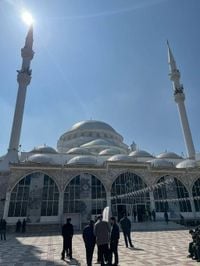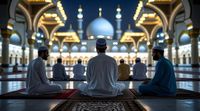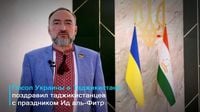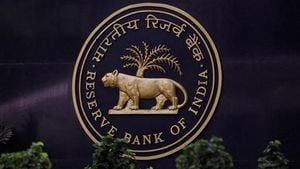In 2025, the Muslim community will celebrate Oraza Ait, also known as Eid al-Fitr, on March 30. This significant holiday marks the end of Ramadan, a month of fasting, reflection, and prayer. The date of Oraza Ait is determined by the lunar calendar, and this year it coincides with the first day of the month of Shawwal.
According to Almaty.tv, the Religious Administration of Muslims in Kazakhstan will announce the schedule for the festive prayer, known as ait-namaz, closer to the date. On this day, fasting is strictly forbidden, as it is a time for joy and celebration.
The ait-namaz is a collective prayer performed in mosques, emphasizing community and unity among Muslims. It is important to note that this prayer is mandatory according to the Hanafi mazhab, with exemptions only for travelers and women, who may attend with their husband's consent. Historically, women were encouraged to participate in the ait-namaz during the time of the Prophet Muhammad, who advocated for their presence.
Before the ait-namaz, Muslims are required to pay fitr-sadaqa, or zakat-al-fitr, which is a form of almsgiving to the needy. The amount for 2025 has been set at 655 tenge per person, approximately equivalent to the cost of two kilograms of flour. Fitr-sadaqa can be given not only in monetary form but also in basic food items such as flour, rice, barley, or dates.
Oraza Ait is not just a day of feasting; it is also a time for gratitude and family gatherings. Muslims are encouraged to reconnect with relatives and share meals, reflecting the holiday's essence of joy and community. Unlike Kurban Ait, no animal sacrifices are made on this day, which further highlights its focus on familial bonds and spiritual reflection.
In Tajikistan, the holiday is acknowledged by various leaders, including the Ambassador of Ukraine, who extended his congratulations to the people of Tajikistan for the upcoming Eid al-Fitr. Similarly, the Saudi Arabian Ambassador to Tajikistan also conveyed his well-wishes to President Emomali Rahmon, emphasizing the importance of this celebration across nations.
As the holiday approaches, families are busy preparing, cleaning their homes, and preparing traditional dishes. Meals typically include pilaf, lagman, manty, shurpa, and beshbarmak, showcasing the rich culinary traditions associated with this festive occasion. Gifts such as the Quran, prayer rugs, and sweets are also exchanged, embodying the spirit of giving.
After the ait-namaz, it is customary for Muslims to visit cemeteries to pray for their deceased relatives, a poignant reminder of the cycle of life and the importance of remembering loved ones. Additionally, the holiday promotes acts of kindness, as neighbors are often treated to festive meals, and assistance is offered to those in need.
Uraza Bayram carries profound religious significance, with its name derived from the Persian word "ruza" (meaning "fast") and the Turkish word "bayram" (meaning "holiday"). Historical accounts suggest that the Prophet Muhammad established this celebration in 624 AD, replacing pagan festivities with a day dedicated to spiritual reflection and community.
As part of the preparations, many Muslims engage in itikaf, a practice involving seclusion in the mosque for prayer and Quranic recitation, lasting from one day to ten days. This spiritual retreat enhances the significance of the holiday, allowing individuals to deepen their connection with their faith.
During the celebrations of Uraza Bayram, Muslims greet one another with the phrase "Id Mubarak," which translates to "Blessed holiday," encapsulating the joy and goodwill of the occasion. However, it is important to observe certain prohibitions during this time. Fasting is not permitted, and engaging in quarrels or heavy labor is discouraged. Alcohol and pork are strictly forbidden, aligning with Islamic teachings.
Ultimately, Uraza Bayram represents a time of peace, unity, and charity. It symbolizes the cleansing of the soul after a month of fasting and serves as a reminder of the importance of compassion and generosity towards others. As families come together to celebrate, the holiday reinforces the values of community and faith that are central to the Islamic tradition.
As the day approaches, Muslims around the world prepare to mark this important occasion, reflecting on the past month of Ramadan and looking forward to the joy of Eid al-Fitr. The celebrations will not only bring families together but also foster a spirit of solidarity and support within communities.









